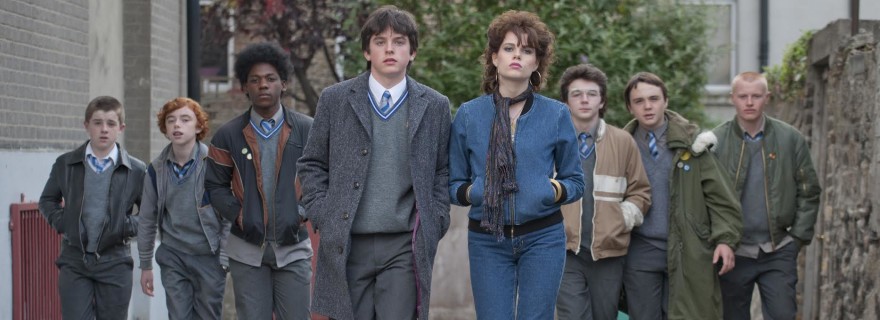'Sing Street'
Movie Rating:
3
John Carney’s unexpected breakout musical romance ‘Once‘ looms large over his latest coming-of-age fairy tale ‘Sing Street’, in ways both good and bad. Following an underwhelming attempt to take his music + drama act stateside with ‘Begin Again‘, Carney has returned to autobiography and Ireland, but brought a little more gloss along with him.
As with his previous efforts, the movie feels achingly personal and succeeds in its most human moments. However, this time the filmmaker’s attempts at finding a more sweeping, crowd-pleasing appeal tend to overwhelm his subtle strengths. It’s still a good movie that will likely plaster smiles on the faces of the right audiences. However, Carney’s increasing embracement of sentimentality only exacerbates the difficulty of repeating the miracle of ‘Once’.
‘Sing Street’ dips back into Carney’s Irish childhood in the 1980s for inspiration. Talented newcomer Ferdia Walsh-Peelo stars as Cosmo, a wayward 14-year-old forced into an overbearing and abusive public school thanks to his parents ongoing financial and marital woes. The only good to come out of that educational hellhole is that it’s located across the street from a boarding house for young girls and he catches the eye of a teen model (or so she claims, anyway) played by Lucy Boynton. In an effort to impress her, the kid claims he’s in a band and asks her to be in a music video. When she agrees, he and his only friend (Ben Carolan) find the only kid in school with instruments (Mark McKenna) and quickly pull together a New Wave group. The band ends up being OK and the girl joins the fun. Under the musical guidance of his watchful college dropout brother (Jack Reynor), Cosmo and friends begin writing songs inspired by a variety of artists. The teen slowly grows into a budding artist, the band congeals surprisingly well, and love blooms. Aww… ain’t music wonderful?
At its best, ‘Sing Street’ grooves by with the gently comedic and poignant naturalism of ‘The Commitments’, only more emo and inspirational in very adolescent ways. The young actors are uniformly fantastic. Their characters are all pretty much dramatic types (the troubled young artist, the mysteriously damaged beauty, the nerd, the bully, etc.), but Carney’s dialogue has spark and they all find ways to make the material feel real. The sense of time and place is impressively immersive, with the writer/director clearly diving into his memory box and recreating lost images through a hazy mix of nostalgia and campy comedy. The message is sweet, particularly when put into the mouth of the remarkably talented Jack Reynor, who transforms a writing device into a lovably flawed young man. There are laughs and tears and ultimately a rousing spirit of elation as the film wobbles its way toward a happy ending. Carney shamelessly strives for a feel-good picture here and generally hits the right notes.
The trouble starts when the music grows beyond childish mimicry and into genuine songs that are supposed to impress. Any movie about a fictional creative talent faces a major challenge in finding a way to present art created by the character that lives up to the reaction it’s supposed to provoke in the narrative. Carney got lucky in ‘Once’ when his actor/musician team delivered some genuinely beautiful songs. Here, the music is a bit whiney, poppy and stale, even though the movie tells us that the songs are extraordinary and life-changing. Granted, the fact that they’re performed by an amateur high school band excuses this misstep somewhat, but the music still underwhelms and hurts the picture. Likewise, Carney and his cast create such a movingly real downtrodden world of failure early on that the giddy rush of excitement and sentimentality provided in the grand finale feels false. The filmmaker leans just a little too hard into his populist instincts, even if the tale is true.
All that being said, some weak songs and an excess of syrup aren’t nearly enough to spoil everything that goes right in ‘Sing Street’. The flaws here are identical to those in ‘Begin Again’. Although they completely killed that movie because everything was a bit more heightened, slick and movie star laden, here the world feels so faithful to painful personal experience and enlivened by eccentric comedic asides that it’s easy to fall into the director’s magical fairy tale spell. While ‘Sing Street’ would undoubtedly be a better movie with an improved soundtrack and a more subdued upbeat ending, Carney hits enough correct notes and cast the picture so well that it’s hard to completely shrug off. This is a sweetly heart-tugging movie that earns its big tissue moments by putting in the hard work to make the audience buy into the schmaltz and love the characters. For those who love an unabashedly feel-good romp, ‘Sing Street’ will scratch an itch, even if it’s unlikely to endure the test of time.




C.C.
You nailed it on why most movies about music don’t work. Once, The Committments (and maybe one or two more) work because the music is genuinely good. I can never buy movies like Almost Famous, or Josie and The Pussycats beacuse you never believe that the world would love them, and the music is awful and would NEVER in any universe be world-stopping hits.
if you have a movie about a singer whose song sets the world on fire, the song in the film better be good enough to be an actual hit – or it destroys the entire premise and suspension of disbelief.
Carney’s Once had actual, great music.
Chris B
I actually liked the music in Get Him to the Greek. Brand was believable as a self-involved rock star…hilarious movie to.